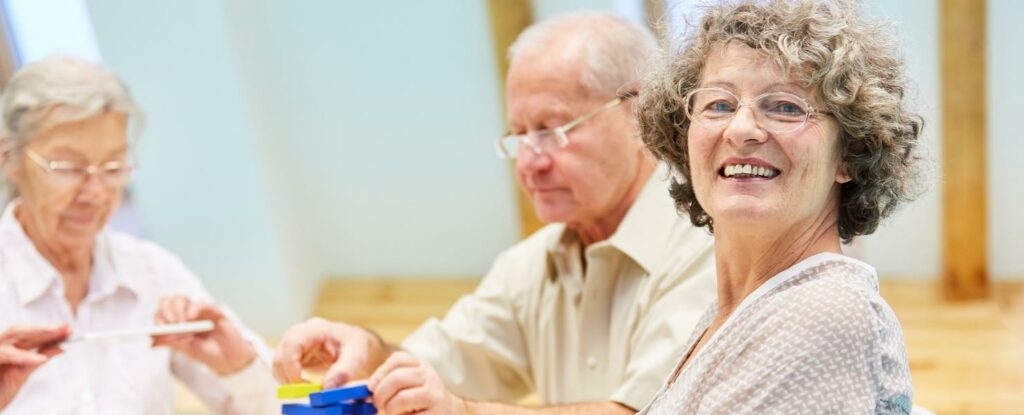Teepa Snow, one of WayWiser’s Trusted Advisors, is passionate about educating people on what dementia is, and also what it’s not.
She’s devoted her life to raising awareness about this often misunderstood condition, and is driven to promote quality of life for those with dementia, and for their loved ones and caregivers.
Because Teepa recognizes—dementia doesn’t only impact the life of the person who has it. It also deeply affects the lives of their families and loved ones.
If you have a loved one who you suspect or know to be experiencing dementia, educating yourself about this condition is a crucial step in effectively navigating it.
Thankfully, Teepa has helpful information and tips for those dealing with this complex issue. If you or a loved one are experiencing dementia, this article will provide you with the knowledge you need to find your best path forward.
Let’s start with an important question.
Is it Dementia, or Something Else?

When you notice a loved one acting differently or experiencing cognitive changes, it’s normal to jump to the conclusion that the underlying cause must be dementia.
While seeking out answers when your loved one is presenting with new challenges and changes is proactive—Teepa advocates avoiding assumptions and quickly labeling an issue as dementia, without further assessment.
“Before we start assuming it’s dementia,” Teepa asserts, “what we need to figure out is: Is this normal for this person or is something changing?” She goes on to explain, “And, if it’s changing, is it something that’s necessarily permanent or is it something we could fix, address, or modify?”
Because we’re all unique, each of us has our own “normal.” What’s typical for you may not be for another—yet this doesn’t mean either is abnormal. Normality is a wide spectrum.
When you notice changes in your loved one’s cognition or behavior, it’s common to worry they have dementia. But, it’s important to know—there are other issues that present with similar outward signs and symptoms.
These include—
- Depression
- Hypothyroidism
- Medication issues or complications
- Hearing or visual issues
- An undiagnosed medical condition such as diabetes
And, unlike dementia, all of these are treatable and even, in some cases, reversible.
With any status change or health concern—it’s vital to seek out a thorough medical evaluation prior to making assumptions about the nature of the problem at hand.
Qualified medical and healthcare providers are trained to assess any underlying medical causes of the outward issues your loved one is experiencing.
They’ll perform necessary testing and assessments. They’ll also obtain important information from you and your loved one about their personal and medical history, as well as information about the recent changes you’ve seen.
Why is this essential?
Because most people aren’t aware of some crucial facts about dementia, like—
- Alzheimer’s disease is a type of dementia, but not all dementias are Alzheimer’s disease
- Not all types of dementia present as problems with memory
- Dementia encompasses approximately 85-90 different conditions, forms, and causes
Redefining Dementia as a Collection of Symptoms

While it’s common to think of dementia as a diagnosis—it’s not. This is a prevalent misconception about this condition.
In truth—dementia is a syndrome, or a collection of symptoms. It is not a medical diagnosis.
Specific types of dementia do qualify as a medical diagnosis. These include Alzheimer’s disease and Lewy body dementia. But, most types of dementia are classified based on outward symptoms, rather than inner etiology.
Teepa visualizes dementia as an umbrella, under which the many different types and issues fit.
Underneath the dementia umbrella, you’ll find—
- Alzheimer’s disease
- Lewy body dementia
- Frontotemporal dementias
- Vascular dementia
- Mixed-picture dementias
- Parkinson’s disease-related dementia
- Multiple sclerosis-related dementia
- Alcohol-induced dementia
The most common symptom of dementia is issues with memory But, it’s important to know that memory issues can present differently, depending on the type of dementia, its underlying cause, and the parts of the brain involved.
For example—some people with dementia experience issues with short term recall. Others have difficulty recalling and processing events accurately. Others experience lapses in memory, or blackouts.
It’s important to know that memory loss, in and of itself, does not mean a person has dementia.
So, what does it mean to have dementia? Teepa’s created a helpful checklist, detailing four things that are true of all types of dementia.
What Does It Mean to Have Dementia?

According to Teepa, an individual’s issues fall under the umbrella of dementia when four criteria are met. Let’s examine these in greater detail.
Dementia Fact #1—
Firstly, to have dementia means that two or more parts of the brain are experiencing change and, ultimately, neural death. The brain is changing, and these changes manifest as cognitive decline. Unfortunately, these changes are not reversible.
Brain skills commonly impacted in dementia include—memory, language skills, reasoning skills (including problem solving), safety awareness, judgment, and insight. Some types of dementia also cause behavioral changes and difficulties with movement and coordination.
Dementia Fact #2—
The second thing that’s true about dementia is that there is, at present, no cure. Teepa explains: “Right now we currently have nothing that’s gonna fix it, cure it, make it go away, or even stop it in its tracks.”
While this information is difficult to hear, it’s important for loved ones to be aware and realistic when dealing with dementia.
No cure doesn’t mean there’s no help and support for those with dementia and their loved ones.
Professionals such as physical and occupational therapists, and speech and language pathologists provide support and assistance to families coping with a member with dementia. Caregiver training can help you learn new strategies to assist and support your loved one with dementia—promoting their safety, independence, and overall quality of life.
Doctors who specialize in assessing and treating patients with dementia symptoms can help with symptom management—through medications, behavioral interventions, or other methods.
Groups and organizations also exist with the mission of offering families dealing with dementia the support, information, and community they need to realize they’re not alone.
The Alzheimer’s Association is a great site to visit, as is The Dementia Society of America. You can also search for support groups in your area—many exist to provide a supportive local community for both you and your loved one with dementia.
Dementia Fact #3—
The third thing to know about dementia is—it’s characterized by ongoing changes. Because dementia is a progressive neurodegenerative illness, the signs and symptoms in those who experience it worsen over time.
According to Teepa, on average this process lasts a range of eight to 12 years. But, each person with dementia is an individual, so their experience will be unique and depend on a variety of internal and external factors.
Which leads us to…
Dementia Fact #4—
Dementia ends at the end of life. Dementia is degenerative and, ultimately, fatal.
Referring to all types of dementia under the umbrella, Teepa explains, “They’re all terminal.” “But, frankly,” she adds diplomatically, “so is life.”
Many people with dementia can continue to experience a rich, full life, for many years. Though changes are a feature of this condition, meeting changes in your loved one with a willingness to adjust and act proactively to support them will go a long way in ensuring quality of life for all.
Teepa offers hope, support, and helpful advice for those coping with a loved one with dementia. She shares her best advice for those coping with a loved one with dementia.
How Can I Help and Support My Loved One With Dementia?

Your loved one with dementia is not the only one who is impacted. The families and loved ones of a person with dementia also keenly experience the effects of this process.
Teepa explains: “Everyone around them is going to be living with dementia in one way or the other,” going on to state, “One person got chosen, but it’s not a choice they ever would have made.” Despite this fact, dementia remains a fact of life for millions of American families.
So what can be done?
It’s important to remember—just because your loved one has dementia doesn’t mean their life is over. People with dementia can continue to enjoy their lives and loved ones, even while coping with the effects of their condition.
Teepa strongly advocates for loved ones to meet people with dementia where they are, and to learn to celebrate all the things they’re still able to do. She encourages loved ones to mobilize, and realize it’s time to make adjustments and changes to best support this person.
Teepa has made it her life’s mission to support and uplift people with dementia and their loved ones. “That’s life under the umbrella,” she explains, “For all of us.”
Dementia can feel overwhelming, and you may wish to deny the changes you’re seeing in your loved one—but denying its existence doesn’t serve you or your loved one.
Addressing this difficult truth, Teepa explains caregivers can, instead, choose to feel empowered, stating, “The choice is yours with dementia.” She encourages loved ones to, “Pull together. Let’s change. Because the change is happening.”
In truth, there’s much families and caregivers of people with dementia can do to help and support their loved ones.
With love, open eyes, and a willingness to be flexible and adjust as needed—you can learn to live with dementia and the changes it brings. And your loved one can continue to find great enjoyment in their life and the valuable time they spend with you.
Stay tuned—WayWiser will be hosting a series of Teepa’s engaging videos, exploring the many complexities of life with dementia.
Here at WayWiser, it’s our mission to support older adults and their loved ones by providing you with all the insight and info you need, on a variety of topics. Visit our Word To The Wise blog regularly for excellent content on issues impacting your health, lifestyle, finances, caregivers, and much more!
Further Reading

Dementia: Teepa Snow Explores Challenging Behaviors
Dementia: Teepa Snow Explores Brain Changes
Dementia: Teepa Snow Shares Advice for Meaningful Activities
Dementia: Teepa Snow Shares Advice on Connecting Through Music
For more lessons from Teepa, take a look at all that she offers on her website.








One thought on “Dementia 101 – Teepa Snow Explores Important Facts To Know About This Complex Issue”
My wife was diagnosed with Dementia in June of 2018. She passed, in May of 2023 after a great 54 years of marriage, I have since fallen in love with a beautiful women and devoutly faithful person. She is showing definite signs of compromised memory and reasoning. (she is medically diagnosed with MCI). I am self diagnosed with MCI. We are inseparable and planning marriage. Is this type of arrangement unheard of? I was able to absorb some of the talking points and use them with my passed wife and (they work). i hope and pray that that I can do the same this time around. Should I share your tips with her? I already have with her daughter.